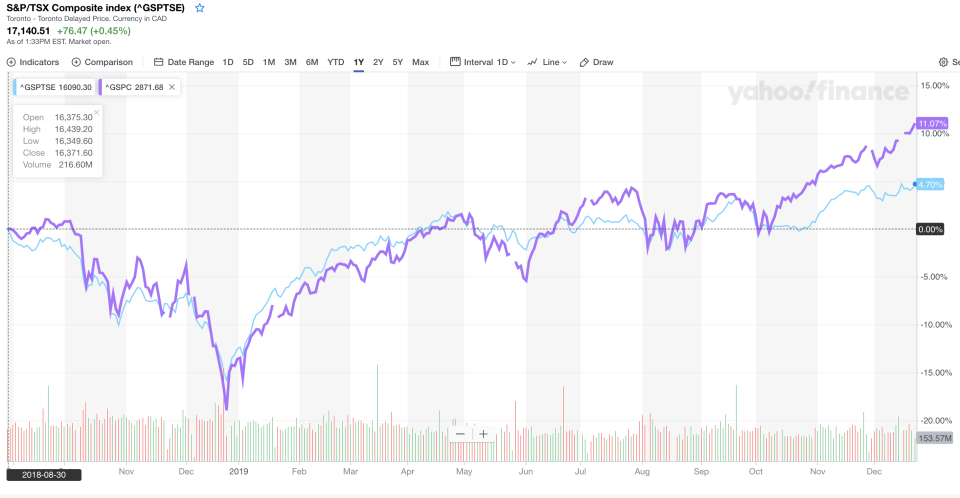Yahoo Finance Canada Story of the Year: Trade wars and recession fears

The effects of tit for tat trade wars — mostly initiated by the Trump administration — rippled across the world, even triggering fears of Canada being sucked into a global recession.
“Trade is certainly the story of the year – it was the 800lb gorilla impacting markets and the global economy in 2019,” Kristina Hooper, Invesco chief global market strategist, told Yahoo Finance Canada.
Nervous central bankers were forced to back away from the rising rate environment that so many were bracing for.
“The trade-driven slowdown in global activity cut inflation pressure, pushed down bond yields, and prompted many central banks, in turn, to reverse course and ease policy,” Douglas Porter, BMO chief economist, told Yahoo Finance Canada.
The Bank of Canada left its key rate unchanged, so variable-rate mortgages didn’t come down. That flipped conventional wisdom about mortgages on its head. Outside of the control of central banks, longer-term bond yields follow market conditions and so fixed mortgage rates became cheaper than variable rates.

Since the Bank of Canada stood pat in the face of 3 interest rate cuts in the U.S., the loonie (CAD/USD) stayed relatively strong.
Real and perceived threats
Even though U.S. President Donald Trump hasn’t followed through on all of his threats, especially when it comes to China, trade slowed around the world.
“This year has seen individual economies part ways in growth performance, but few fully escaped the downturn seen in global trade volumes tied, at least in part, to the disruptions associated with actual and threatened trade wars,” Avery Shenfeld, CIBC chief economist, told Yahoo Finance Canada.
Canada had trade tensions with two of its biggest trading partners and has faced its own economic slowdown. USMCA, or NAFTA 2.0, had moments of drama. And although China’s ban on Canadian beef and pork was lifted, canola is still blocked.
“In Canada, we’ve also seen a slowing in consumer spending growth, but the headwinds from global trade disputes, including softer world oil demand growth, issues pertaining to Canada-China trade... were central to concerns that recession risks were growing, risks that thankfully we’ve managed to escape thus far,” said Shenfeld.
Canadian and U.S. farmers have suffered during the disputes with China, forcing each government to offer financial assistance. Consumers in the U.S. are paying more for a number of imported goods.
Canada has also become something of a tool for the U.S. against China.

“While Canada initially attempted to have preferential access to the U.S. and China, as evidenced by PM Trudeau’s unsuccessful visit to China to secure a trade deal in November 2017, Canada now has implemented a series of policies regarding Huawei, steel and aluminum, and export controls, to close China’s backdoor to North America through Canada,” Dan Ujczo, Dickinson Wright trade lawyer, told Yahoo Finance Canada.
Stock market gyrations
If you took a peek at North American stock markets and saw violent swings, there was a good chance Trump’s tweets had something to do with it.
“Trade dominated markets this year: positive news flow around tariff wars sent stocks higher on many occasions, while negative news pushed stocks lower,” said Hooper.
But despite the day to day fluctuations, conditions were just right to push major stock indices (TSX) (S&P500) to record highs.

“Because growth only slowed—and didn’t collapse—equity markets benefited massively from an environment of easing monetary policy, cool inflation, and modest economic/profit growth,” said Porter.
Where we go from here
Despite being impeached, the chances of Trump being kicked out of office are slim. So, unless voters elect a new President in November 2020, we can expect more of the same.
“We are on the march to managed trade, which is a world of more tariffs, export controls, voluntary export restraints, and complex trade agreements such as USMCA and the U.S. deals with Japan and Korea,” said Ujczo.
“This will lead to these developments becoming permanent, at least for the foreseeable future, as once companies restructure, they will no longer argue to ‘go back to the way it was.’”
The Trump administration has claimed a number of what it sees as victories along the way. He’ll likely highlight them in his bid to get reelected.

“On a more political level, the President’s successes with China, Japan, Korea, and the USMCA will be key talking points on the campaign trail throughout 2020,” said Ujzco.
“Whether or not these transform the economy or catalyze a recession will be a defining feature of the 2020 campaign.”
Jessy Bains is a senior reporter at Yahoo Finance Canada. Follow him on Twitter @jessysbains.
Download the Yahoo Finance app, available for Apple and Android.

 Yahoo Finance
Yahoo Finance